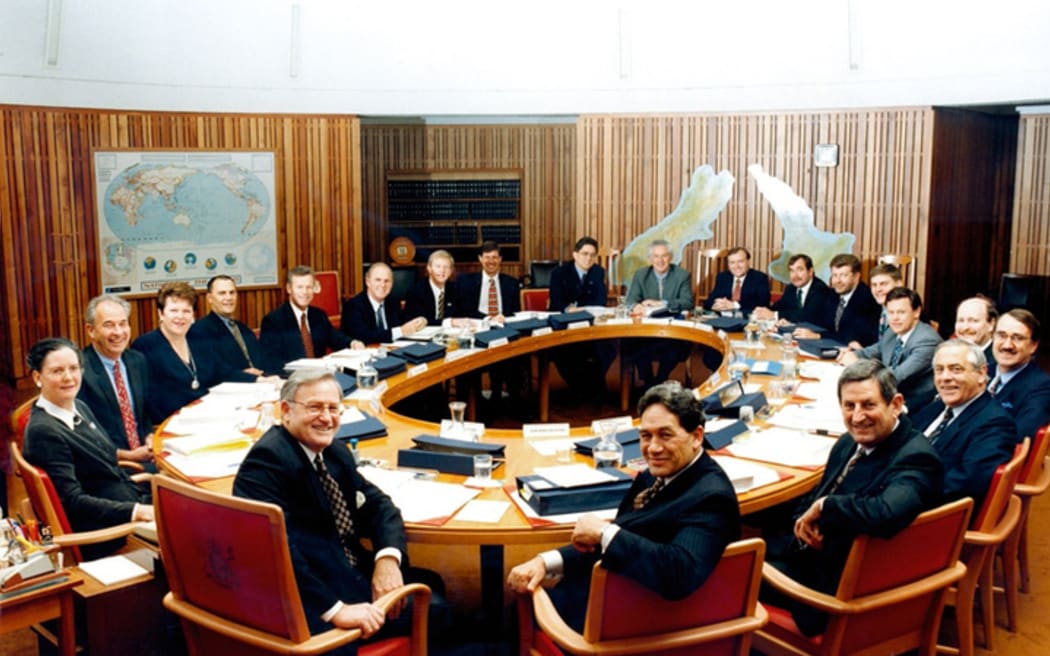Jim Bolger, New Zealand's prime minister for much of the 1990s, has died aged 90.
In a statement, his family said Bolger died peacefully on Wednesday surrounded by his nine children, 18 grandchildren and wife Joan.
It said over the period of his illness, Bolger and his family had greatly appreciated the support and companionship of so many friends near and far.
Joan and family have thanked the renal team and staff at Wellington Regional Hospital and Wellington Free Ambulance for their care over recent months.
His family said Jim was much loved and would be deeply missed.

Jim Bolger at home in 2016. Photo: RNZ / Rebekah Parsons-King
Prime Minister Christopher Luxon said Bolger was a towering figure in New Zealand's political life - a leader of conviction, a reformer of consequence, and a servant of the people whose legacy has shaped the nation in profound and lasting ways.
Foreign Affairs Minister Winston Peters, Bolger's coalition partner in New Zealand's first MMP government, said the former prime minister was a man of his word, and after leaving poltics continued to advance New Zealand's interests on the international stage.
Early life
Born to Irish immigrants in the Taranaki town of Ōpunake in 1935, Bolger told RNZ's Sunday Morning earlier this year that his Irish ancestry helped him to understand and engage with Māori.
"I sort of instinctively knew what it was like to be treated as second-class citizens, and Māori were treated as second-class citizens. And some people still want to do that," he told the programme in June - the day after a birthday celebration that included his nine children and 18 grandchildren.
Bolger was convinced of the benefits of cultural diversity, held strong views against racism and was in favour of redress for Maori. He negotiated the 2008 settlement of the Atihau-Whanganui Incorporation, which gained it $23.5 million in compensation from the government.
After his education at Ōpunake High School was finished, 15-year-old James Brendan Bolger went farming, first in Taranaki and then at Te Kuiti. He married Joan Riddell in 1963.

Jim Bolger at an OECD meeting in Paris in 1982 Photo: Supplied
He entered politics via Federated Farmers - he had been vice-president of its Waikato branch - and won the new King Country seat for National in 1972. He built his majority over the years from the initial 1200 to more than 10,000 and held the seat for 25 years.
Bolger showed himself to be a quick learner and an effective debater in the House and following the 1978 election, he became a minister in the Muldoon government.
After National's defeat in 1984 he became deputy leader when Sir Robert Muldoon was replaced by Jim McLay. When McLay was ousted in 1986, Bolger's colleagues elected him to the top job.
He disliked being described as a pragmatist, but was sensitive to shifts in the public mood and accommodated them by adopting policies he had earlier rejected. For example, after National's 1987 defeat he steered the party away from its isolated opposition to an anti-nuclear policy. The move upset some of his MPs, but he saw it as looking to the future rather than the past.

Prime Minister Jim Bolger and Finance Minister Ruth Richardson during the release of the 1991 budget. Photo: Te Ara / Public Domain
National easily won the 1990 election, setting Bolger on his seven-year career as Prime Minister. Although the party had criticised Labour's New Right policies, his government extended them. Welfare benefits were cut, and controversial reforms to healthcare and industrial relations were made.
Narrowly re-elected in 1993, Bolger moved to soften the government's image and dropped his hardline finance minister, Ruth Richardson. In the next three years, he kept National in power as internal strife affected all political parties in the run-up to the new MMP system.

PM Jim Bolger in 1999 Photo: AFP
1996 was the first election to be held under MMP and after it Bolger - nicknamed The Great Helmsman - formed a coalition government with New Zealand First. The negotiations took weeks and many in National believed Bolger had given away too much.

Jim Bolger and Winston Peters at the head of the first MMP coalition government in 1996. Photo: Supplied
The coalition government floundered through its first year and Bolger's support ebbed. He was ousted in late 1997, in a rare coup against a sitting prime minister, by Jenny Shipley. He published an account of his years as Prime Minister, A View From The Top, in 1999.
He quit parliament in April 1998 to become ambassador in Washington, returning to become chairman, under the Labour-led government, of New Zealand Post, Kiwibank, and the state rail system. He became increasingly outspoken about broader political and social issues, going so far as to say, in 2021, that free-market capitalism was 'on the verge of destroying the planet'.

Prime Minister Jim Bolger announces Winston Peters' dismissal from cabinet, 1991 Photo: The Dominion Post / John Nicholson
He was a persistent advocate of New Zealand becoming a republic and took no imperial honours but was appointed a Member of the Order of New Zealand in 1998. Bolger was awarded the Queen Elizabeth II Silver Jubilee Medal in 1977, the New Zealand 1990 Commemoration Medal and the New Zealand Suffrage Centennial Medal in 1993. Massey University awarded him an honorary doctorate in literature in 2002.
Bolger credited Joan for the huge support she gave him during his high-profile career.
"I've had a wonderful life with a wonderful wife and family and it's all been good."

From left: Jim Bolger, Queen Elizabeth II, Dame Te Atairangikaahu and Sir Doug Graham at the Tainui treaty settlement, 1995. Photo: The Dominion Post / John Nicholson






